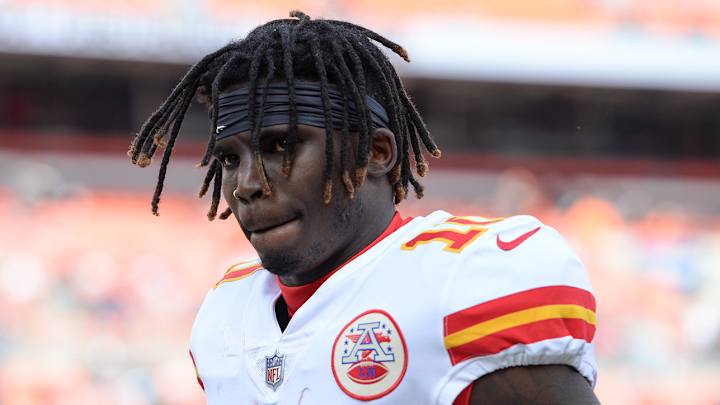NFL Needs to Change a System That Reduces Risk for Teams to Take on a Troubled Player

Tyreek Hill is surely done playing for the Kansas City Chiefs, and he might be done playing in the NFL. He has been convicted of domestic abuse (in the court of law) and child abuse (in the court of public opinion, for credible reasons). Any team that signs him must accept the recent chilling audio of Hill threatening his fiancée Crystal Espinal as its new soundtrack. There is Espinal asking why the couple’s three-year-old son says “Daddy” broke his arm, and there is Hill telling Espinal, “You need to be terrified of me, too, b----,” and there is this context: In 2015, Hill was convicted of choking and punching Espinal. The Chiefs vouched for him then.
It is tempting to say the Chiefs gambled on Hill and lost.
The cold truth is that they gambled on Hill and won.
The Chiefs drafted Hill in the fifth round in 2016. They got one of the best playmakers in football for three years, at an extremely below-market salary. They will have to part ways soon, but in a football sense (though obviously not a moral one) the Chiefs benefited from the transaction.
Kansas City took advantage of a system that, at a certain point, incentivizes teams to draft and sign high-risk players. The Chiefs got an early-round talent at a late-round price precisely because of his violent history. What happened with Hill is what happens with a lot of players with criminal histories: Some teams take the players off their draft board completely, and others downgrade them because of the risk. The result is that the player gets punished by getting drafted later, but the team that drafts them can get a huge payoff.
This is presumably not the system that NFL commissioner Roger Goodell wants. But it’s the system he has. Fixing it will not be easy, but it is necessary.
Goodell has wide latitude to deal with individual cases, and it’s fair to assume that Hill will face significant punishment, even though he has not been charged. (The case was reopened after the audio leaked.) Goodell also has wide latitude to fine and discipline clubs (ask the Patriots), and he could conceivably use it to punish the Chiefs, using whatever rationale sounds like it fits. But the larger systemic problem will still exist. If Goodell does not address it, he can be sure that next spring, some NFL team will use a late-round pick on a “troubled” player, and the Tyreek Hill saga will play out again.
Running an NFL team is a constant exercise in risk management. Big contracts are a risk. Trading draft picks is a risk. Right now the only risk in drafting a player like Tyreek Hill is in the pick (usually a low one) and the public fallout. The Chiefs figured both were worth it. Even today, after a week of nasty headlines, they were probably right.
Goodell should try to find a way to add to that risk. This is easy for a columnist to write and hard for a commissioner to execute. Recent NFL history is full of overcorrections and complicated rules with unforeseen consequences. There are no simple answers, and the Players Association should have a voice in the discussions. But Goodell should try.
How can he do it? Goodell could assign teams points whenever one of their players get in trouble, with the understanding that at a certain threshold, teams would be docked draft picks. This would be similar, in structure, to how NBA players are suspended after accumulating too many technical fouls. But would a player on the practice squad count as much as a starter? And if a player who has never been in trouble before gets arrested, should his team be punished as harshly as, for example, the Chiefs, who knowingly signed a domestic abuser?
It probably makes more sense for the league to flag certain players as high risk, based on their criminal histories, and set up a system that punishes the team that drafts or signs them if the players get in significant trouble again. The punishment could be greater depending on how well the player plays. (Mike Florio of Pro Football Talk recently suggested this.)
In the Chiefs’ case, they would not be sitting here today knowing they got massive production from a fifth-round pick on a cheap rookie deal. They would know the league was about to dock them a higher draft pick, too.
And they would have drafted Hill knowing that risk was there, just as they would have traded for Frank Clark recently knowing that risk was there. (Clark was kicked off his college team after a domestic violence arrest.)
A system like that would not stop teams from taking risks. But it would probably stop them from taking as many risks as the Chiefs did. It would also encourage teams to provide emotional and psychological support for the players who need it most.
Teams always say they did their research and they are comfortable with their selections. Goodell should make them less comfortable, for the sake of his league.

Michael Rosenberg is a senior writer for Sports Illustrated, covering any and all sports. He writes columns, profiles and investigative stories and has covered almost every major sporting event. He joined SI in 2012 after working at the Detroit Free Press for 13 years, eight of them as a columnist. Rosenberg is the author of "War As They Knew It: Woody Hayes, Bo Schembechler and America in a Time of Unrest." Several of his stories also have been published in collections of the year's best sportswriting. He is married with three children.
Follow rosenberg_mike